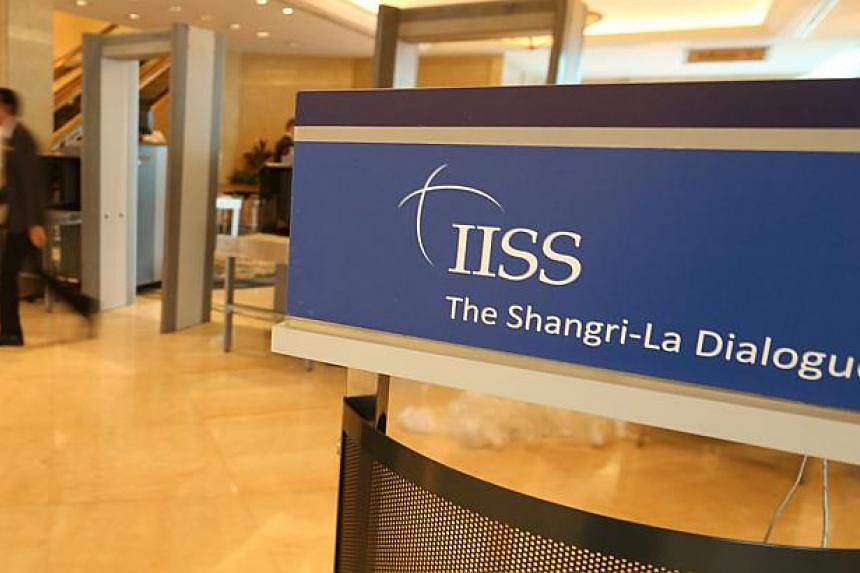
DEFENCE chiefs from 26 nations gather here for the annual Shangri-La Dialogue amid worsening tensions over the South China Sea.
They will meet against the backdrop of the strategic bookending of Asia by Japan and India amid the steady progress of the US rebalance towards the region.
Prime Minister Lee Hsien Loong will deliver the keynote address tonight, at the start of the annual three-day conference hosted by the International Institute for Security Studies (IISS).
This year's meeting has drawn strong interest even from Europe, with the French, Spanish and German defence ministers having confirmed their attendance at the meeting.
China is sending its deputy chief of general staff, Admiral Sun Jianguo, a four-star officer.
That China is sending a navy man, and an officer of a higher rank than it sent to lead its team last year, is indicative of Beijing's perception that the South China Sea dispute will be front and centre in this year's conference.
On Tuesday, China released a defence White Paper that accused foreign powers of being "busy meddling" in the South China Sea.
Starting with the United States, and leading Asian powers such as Japan and Indonesia, many of the defence ministers at this year's Dialogue are new to their roles. That raises the possibility of fresh thinking surfacing amid the worsening tension.
Diplomatic sources say new US Defence Secretary Ashton Carter will make a forceful commitment to ensuring that sea- lanes stay open in the South China Sea and that freedom of navigation is maintained.
While Vietnam and the Philippines are not blameless in this context, having done drilling or construction in disputed waters, no nation has been more active than China.
This month, US Assistant Secretary of State Daniel Russel told the Senate Foreign Relations Committee that in the past 11/2 years, China's massive land reclamation on and around formerly tiny features, some of which were underwater, has created a number of artificial above-water features.
Three of China's landfill areas, he said, are larger than the largest naturally formed island in the Spratly Islands. China is also undertaking land reclamation in the Paracel Islands, which it currently occupies.
"These strategic policies of major powers and their implications for other Asia-Pacific states will almost certainly be the main subject for discussion at the 2015 IISS Shangri-La Dialogue," says Dr Tim Huxley, executive director for Asia at the IISS.
"This will notably be the case in the plenary sessions, which will focus on the major powers' strategies, the control of conflict escalation, more active conflict resolution, new forms of security collaboration, and building security links with other regions as their themes."
China's unilateral actions in the South China Sea and its move to announce a "nine-dash line" claim in the area while refusing to specify the line's specific coordinates, have raised worries in Asia. This will be reflected at the Shangri-La Dialogue.
"For the first time, there is a special session focusing particularly on the security concerns of small states," says Dr Huxley.
This year's meeting in Singapore takes place amid three major developments in the strategic space over Asia.
First, the US rebalance is progressing steadily.
Second, Japan and India are emerging as strategic bookends in the Asia security equation with the US both surrounding the area as well as staying in the centre.
The increasing Japanese interest in security beyond its shores was underscored by the first joint military exercises it conducted earlier this month with the Philippines in a non-contested portion of the South China Sea. Tokyo is also planning joint patrols with the US in the South China Sea.
Likewise, India is signalling it, too, has vital interests in the waters and beyond, although it is not a claimant state there.
Earlier this year, Indian Prime Minister Narendra Modi and US President Barack Obama announced a joint vision for the Indo-Pacific that signalled greater strategic responsibilities for South Asia's dominant power in the wider region.
"Increasingly, the phrase we are told to use is 'Indo-Asia Pacific'," says Rear-Admiral Mark Montgomery, operations head at the US Pacific Command in Honolulu, Hawaii.
A third factor is that almost every Asian state is raising its military spending. This year, China unveiled a defence budget of US$145 billion (S$196 billion) for 2015 at the National People's Congress. Asian nations with testy ties with China, such as India and Vietnam, have responded by stepping up their own defence spending. Even Japan is signalling a modest increase in defence outlays.

